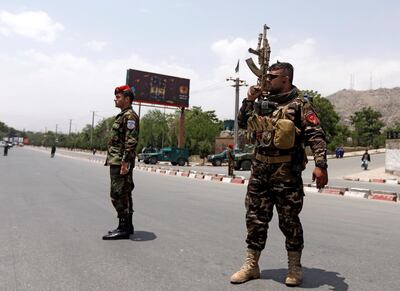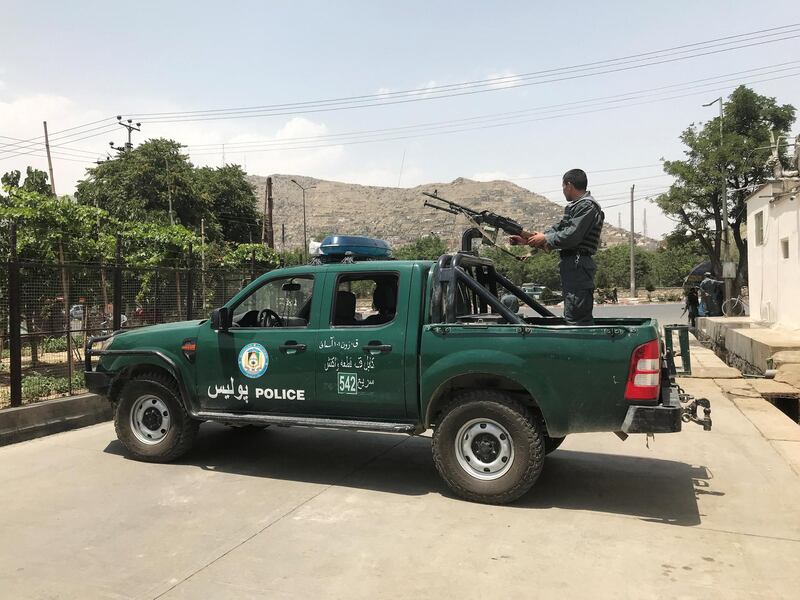A suicide bomber killed at least eight people at a gathering of Afghanistan’s top clerics on Monday, just minutes after they issued a fatwa declaring militant attacks un-Islamic and called on Taliban insurgents to enter peace talks.
“One police man and seven civilians were killed and around 14 are injured,” said Kabul police spokesman Hashmat Stanikzai.
Just moments before the blast at the Loya Jirga tent in Kabul, more than 2,000 religious leaders gathered there had issued a decree against the violence perpetrated by the Taliban. The hardline Islamist group has waged war against foreign forces and western-backed governments since the 2001 US-led invasion that deposed them.
“The war in Afghanistan is illegal and has no root in Sharia,” the clerics said in a statement issued at the end of the meeting. “We the religious Ulema call on the Taliban to respond positively to the peace offer of the Afghan government in order to prevent further bloodshed in the country.”
Abdul Basir Haqqani, head of Kabul's Ulema Council, told The National that several participants in the gathering were among the dead or injured.
“We were all leaving the venue after the meeting; I was in my car at the gate of the Loya Jirga tent when the explosion happened,” said Mr Haqqani, who was uninjured.
“Many of my friends were among the wounded; Ulema members and representatives of mosques,” he said. “A friend of mine, Gul Ahmad Delawar, from the Ministry of Haj and Religious Affairs, was also badly wounded.”
While the Taliban has criticised the members of the Ulema Council in the past for being “pro-government”, they denied involvement in the attack.
“Today’s blast in Kabul has nothing to do with the Mujahideen of Islamic Emirates,” spokesman Zabihullah Mujahid wrote on Taliban-linked social media accounts.
__________
Read more:
Afghan forces kill repel attack on interior ministry in Kabul
Kabul suicide bomber targets blood drive for victims of earlier attack
__________
Afghanistan’s Ulema Council, a government-funded but autonomous body of religious leaders, was set up after the fall of the Taliban in 2002, and has a presence in all the country’s provinces. As of 2017, the council had more than 3,000 members — religious scholars and clerics, both Sunni and Shiite — representing the Islamic diversity of the country. Their role is mainly to advise the government and political bodies on matters of morals and Sharia. They have attempted several times to promote a peaceful solution to the Afghan conflict, and have been accused by the Taliban of being “puppets of the government”.
In an article on the group’s website in March, the Taliban criticised the government’s efforts to involve the Ulema Council in pressuring the group to accept President Ashraf Ghani’s offer of peace talks.
“The desire of Kabul puppet administration officials to twist religious commands such as Jihad for the malicious desires their masters by misusing the status and name of Islamic scholars will never be fulfilled,” it said.
But Mr Haqqani said it was the council’s responsibility to ask the Taliban and other insurgent groups to join the peace process. “We, like all Afghans, are tired of daily explosions and bloodshed," he said”. How can the Taliban believe this to be a war in the interest of Afghanistan when Afghans are dying every day?”
“We fulfilled our duty by urging the Taliban and other insurgents to accept peace. It will be in everyone’s benefit if they do, but if they don’t, I will ask Allah to punish them,” he said.

The bombing in Kabul came as another religious scholar was killed in the southern province of Kandahar.
Maulavi Mohammad Haq Khatib, also a pro-government religious leader, was shot by gunmen on Monday morning, local sources told The National.
Khatib was a popular local figure and served as a religious scholar at the Mui Mubark Masjid for nearly 20 years.
"I came to know Maulavi Khatib during my time as the spokesman for the Kandahar governor. He was never against anyone but always preached for unity, peace and building Afghanistan," Javid Faisal, a candidate from Kandahar in the October general elections, told The National.
Another religious scholar in Kandahar, Maulavi Abdullah Fayaz, was assassinated in a similar manner in 2005, a week after organising a similar council of clerics to denounce then Taliban leader Mullah Muhammad Omar





